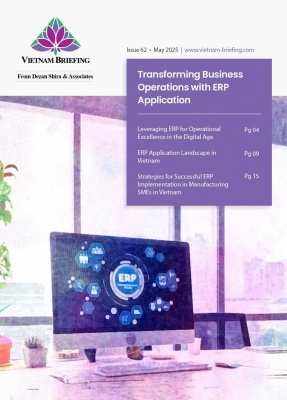Vietnam Passes First-Ever Law on Digital Technology Industry
Vietnam becomes the first country to pass a dedicated law on the digital technology industry. The new law introduces tax incentives, defines digital assets and AI regulation, and sets an ambitious goal to build 150,000 digital tech firms by 2035.
Vietnam has officially become the first country in the world to enact a standalone law dedicated exclusively to the digital technology industry. Passed on June 14, 2025, during the ninth sitting of the 15th National Assembly, the Law on Digital Technology Industry (Digital Technology Law) will come into effect on January 1, 2026.
With overwhelming support, 441 out of 445 deputies voting in favor, the law is positioned to change Vietnam’s digital economy, bringing legal certainty to sectors such as artificial intelligence (AI), digital assets, and data services.
Drafted by the Ministry of Science and Technology, the legislation underpins national ambitions for digital transformation, supporting domestic innovation, enhancing competitiveness, and promoting global integration. It also aligns with Resolution No. 57-NQ/TW and No. 68-NQ/TW, emphasizing science, technology, and private sector development.
Laying the legal foundation for digital innovation
The Digital Technology Law introduces structured incentives for a broad spectrum of stakeholders. Central to the law is a commitment to increase the production and global competitiveness of Vietnam’s tech products under the “Make in Vietnam” initiative. The government targets the development of 150,000 digital technology enterprises by 2035.
Domestic startups are eligible for up to 50 percent subsidies on technology acquisition and prototype development, while small and medium-sized enterprises (SMEs) will receive financial and training support. These include public procurement preferences and infrastructure investment assistance.
Foreign-invested enterprises (FIEs) are also encouraged to transfer advanced technologies and collaborate with domestic firms. In return, they are offered long-term corporate income tax reductions and other investment incentives, policies meant to deepen integration into global supply chains and promote technology localization.
Read more: Vietnam’s Semiconductor Industry: Progress and Outlook Beyond 2025
Fiscal incentives and investment support
An important component of the new law is its holistic fiscal framework to support digital production and innovation. Government-backed funding will prioritize high-tech and innovation-driven projects, while tax breaks and import duty exemptions will apply to essential equipment and research and development (R&D) activities.
Enterprises operating in the digital technology space will be granted tax incentives similar to those provided in specially disadvantaged areas, making them attractive to both local and international investors. Capital support from state investment funds and grants further facilitates expansion.
|
Fiscal incentives under Digital Technology Law |
||
|
Type of Incentive |
Beneficiaries |
Details |
|
Corporate Tax Reductions |
FIEs meeting tech-transfer goals |
Enterprises collaborating with local partners may receive multi-year corporate income tax reductions. |
|
Technology Acquisition Subsidies |
Startups and SMEs |
Up to 50 percent of the cost to acquire advanced technology and develop prototypes is reimbursable. |
|
Import Duty Exemptions |
Tech manufacturers and R&D projects |
High-tech equipment used in production or R&D may be exempt from import duties. |
|
Infrastructure Investment Support |
SMEs and strategic investors |
Government will support infrastructure investment costs and prioritize procurement for qualified SMEs. |
|
Grant Funding |
Innovation projects and digital transformation |
State-backed funds will provide financial support to approved projects focused on technological innovation. |
Building a global digital workforce
The law places strong emphasis on workforce development. Qualified digital professionals, both domestic and foreign, will benefit from several advantages. Vietnamese experts in the field will be exempt from personal income tax for the first five years of their employment. Foreign experts are entitled to five-year visas and exemption from work permit requirements, significantly reducing administrative barriers.
The government also commits to funding digital education, including curriculum development, certification programs, and upskilling initiatives. Companies that invest in training their digital workforce can apply for financial support and tax relief.
Legal framework for AI and emerging tech
Vietnam’s Digital Technology Law has adopted a forward-looking, risk-based approach to AI. AI systems are categorized into high-risk and non-high-risk groups, with high-risk applications subject to stringent compliance obligations, technical standards, and oversight. Products powered by AI need to be clearly marked to ensure accountability and transparency.
The government also intends to allocate funds for AI research and data center infrastructure to support the sector’s rapid growth. The legislation has outlined prohibited uses of AI and ethical standards, ensuring technology development aligns with public safety and privacy norms.
Read more: Vietnam’s AI Sector in 2025: Regulatory Frameworks and Opportunities for Investors
Crypto, virtual assets, and the legal sandbox
For the first time, Vietnam has introduced a legal framework for digital assets, including both virtual and crypto assets. The law distinguishes between the two and mandates strict regulation by state agencies to ensure cybersecurity, prevent financial crimes, and combat illicit activities like money laundering and terrorism financing.
The legislation also breaks new ground in formally recognizing and regulating digital assets, including cryptocurrencies and other forms of tokenized virtual property. For the first time, investors and businesses operating in the digital asset space will be governed by state-supervised frameworks. These include rules for ownership, financial transparency, and consumer protection. Regulatory oversight will be especially strict to prevent financial crimes such as money laundering and the misuse of virtual assets in illicit activities.
An important feature here is the establishment of a regulatory sandbox, a mechanism allowing select businesses to test new virtual asset technologies under state-approved conditions. Participants in the sandbox are temporarily exempt from certain legal obligations, enabling innovation without regulatory risk. This is a major step forward in integrating blockchain, DeFi (decentralized finance), and fintech into the formal Vietnamese economy.
To position Vietnam as a digital hub, the law mandates the establishment of Vietnamese digital technology representative offices in major global markets. These offices will coordinate with international cooperation programs to assist domestic firms in becoming multinational competitors.
Digital technology zones, similar to special economic zones, will be developed with favorable regulatory and fiscal policies to attract investment. These zones will focus on semiconductor production, software development, and eco-friendly tech.
In brief
Vietnam’s Digital Technology Law is more than a legal framework; it is a national strategy to transform the country into a global digital powerhouse. The inclusion of workforce incentives, technology transfer mandates, crypto regulation, AI standards, and support for startups shows a deliberate, future-oriented approach.
Vietnam is now among the top contenders in Southeast Asia for tech investment, digital manufacturing, and innovation-driven business development.
About Us
Vietnam Briefing is published by Asia Briefing, a subsidiary of Dezan Shira & Associates. We produce material for foreign investors throughout Asia, including ASEAN, China, and India. For editorial matters, contact us here and for a complimentary subscription to our products, please click here. For assistance with investments into Vietnam, please contact us at vietnam@dezshira.com or visit us at www.dezshira.com.
Dezan Shira & Associates assists foreign investors throughout Asia from offices across the world, including in Hanoi, Ho Chi Minh City, and Da Nang. We also maintain offices or have alliance partners assisting foreign investors in China, Hong Kong SAR, Dubai (UAE), Indonesia, Singapore, Philippines, Malaysia, Thailand, Bangladesh, Italy, Germany, the United States, and Australia.
- Previous Article Vietnam’s Special Investment Procedure: Implementation and Implications for Foreign Investors
- Next Article Vietnam Government Extends 2% VAT Reduction on Specific Goods and Services till End of 2026































